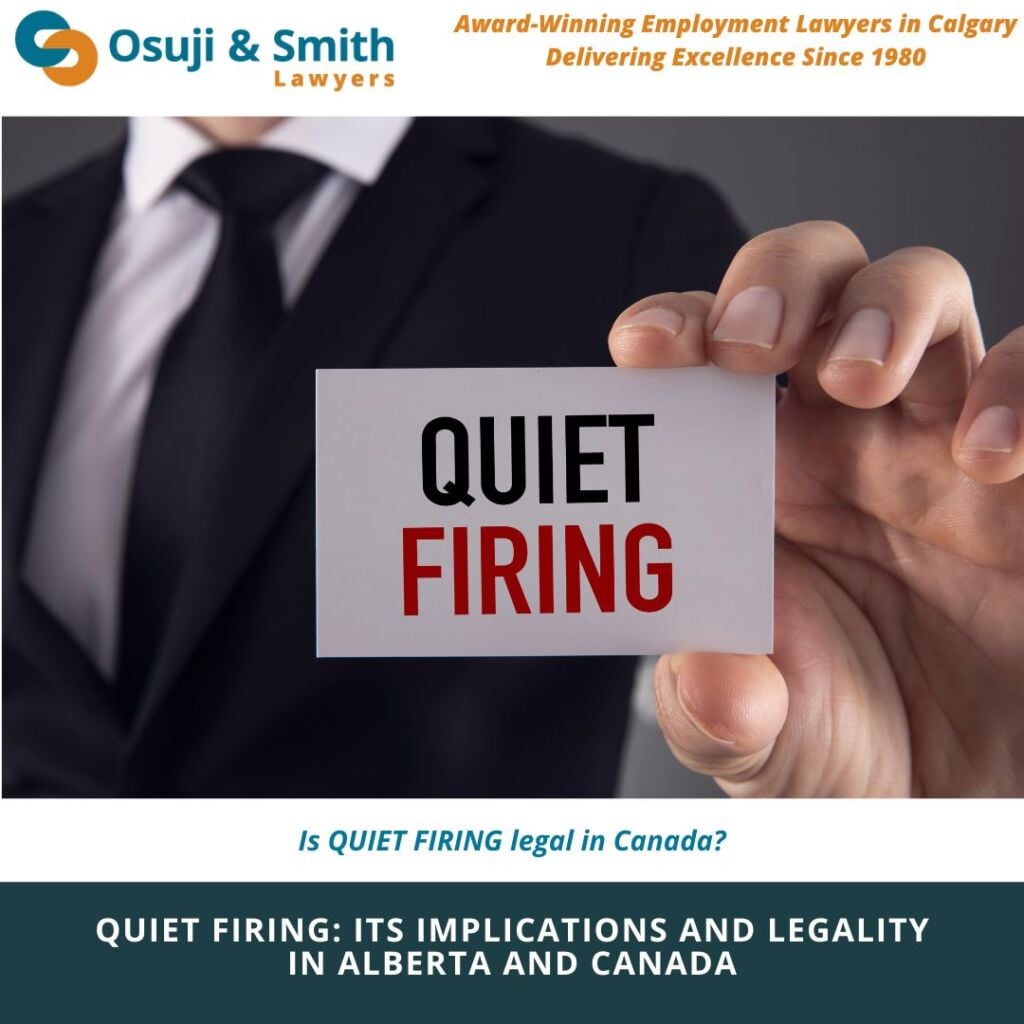Quiet Firing: Its Implications and Legality in Alberta and Canada
Is QUIET FIRING legal in Canada? The short answer is no.
Quiet firing, also known as constructive dismissal, is a term used to describe a situation where an employer creates such an untenable work environment that the employee feels compelled to resign. This could involve changes to an employee’s role, responsibilities, working hours, or salary without their consent, creating a hostile work environment, or failing to take action against workplace bullying.
Understanding the dynamics of quiet firing is essential, particularly in the province of Alberta, as employment relationships are governed by various laws and regulations, including the Alberta Employment Standards Code and the Canadian Labour Code.
What Does Quiet Firing Mean in Alberta?
In the context of Alberta, quiet firing manifests as constructive dismissal. Constructive dismissal is essentially a unilateral change to the fundamental terms of the employment contract by the employer, without the employee’s agreement. These changes could relate to pay, hours of work, job location, or roles and responsibilities that the employee initially agreed to when they accepted the job.
Constructive dismissal is not about minor changes or dissatisfaction with managerial decisions; it’s about substantive alterations to the employment contract. For example, a significant cut in salary, demotion, or a forced relocation could amount to constructive dismissal.
The Alberta courts have established two conditions that must be met for a case to qualify as constructive dismissal:
- A unilateral and substantial change to a fundamental term or condition of the employment contract by the employer.
- The employee’s refusal to accept the change and thereby treat the employment contract as being at an end.
It’s important to remember that not all unpleasant experiences or changes in the workplace will constitute constructive dismissal. The changes have to be significant and fundamental, and not temporary or trivial.
Is Quiet Firing Legal in Canada?
The short answer is NO, BUT quiet firing, as a form of constructive dismissal, is not inherently illegal in Alberta or Canada. However, employers must be very careful when making significant changes to an employee’s role or contract, as these could potentially be seen as constructive dismissal.
Under the Alberta Employment Standards Code and the Canadian Labour Code, employers have certain obligations to their employees. Any significant, unilateral change in the terms of employment may breach these obligations, leading to potential legal repercussions.
An employee who believes they have been constructively dismissed could potentially sue for wrongful dismissal damages. In a successful wrongful dismissal claim, the employee could be entitled to notice or pay in lieu of notice, among other potential damages.
However, it’s crucial to note that constructive dismissal claims can be complex and challenging to prove. The employee must demonstrate that the employer intended to end the employment relationship, or at least that the changes were so substantial that they inevitably led to the termination of the relationship.
Furthermore, the burden of proof in such a case falls on the employee, not the employer. This means that the employee must provide evidence that their employer unilaterally changed their contract or work environment so significantly that it constituted constructive dismissal.
While quiet firing, in the form of constructive dismissal, is not explicitly illegal in Alberta or across Canada, it comes with substantial legal risks for employers. It can lead to potential claims of wrongful dismissal and may result in legal penalties, including compensatory damages.
Employees experiencing such situations should consult with an employment lawyer to understand their rights and potential remedies fully. Similarly, employers should also seek legal advice before making any significant changes to an employee’s work conditions or contract, to ensure that they are acting within the legal boundaries of Alberta’s and Canada’s employment laws.
CONTACT OSUJI & SMITH, CALGARY EMPLOYMENT LAWYERS for HELP


